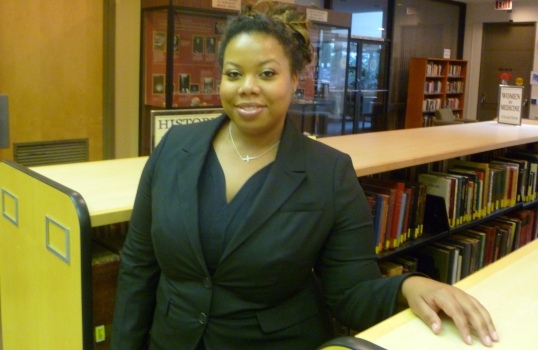 Lauren Powell first experienced health disparities right at home. Raised in an urban neighborhood, the 29-year-old Indianapolis native has lost 10 family members, most of them under 60, to terminal and chronic illnesses. Four more relatives are currently battling late-stage cancer.
Lauren Powell first experienced health disparities right at home. Raised in an urban neighborhood, the 29-year-old Indianapolis native has lost 10 family members, most of them under 60, to terminal and chronic illnesses. Four more relatives are currently battling late-stage cancer.
Powell’s view of racial health inequities widened from her own family to entire communities when, during her senior year of college at Xavier University in New Orleans, she observed Hurricane Katrina’s aftermath in the city’s poor, predominantly black Ninth Ward.
“Social injustices, specifically health disparities, were in my face,” she recalled. “I couldn’t ignore them.”
Now a PhD candidate in the Graduate School of Biomedical Sciences program in population and clinical health research with a concentration in health disparities, Powell has been awarded a prestigious Schweitzer Fellowship that affirms and advances her commitment to achieving health equity for all races, ethnicities and socio-economic groups.
Schweitzer Fellowships honor the legacy of physician and humanitarian Dr. Albert Schweitzer by supporting emerging professionals who are dedicated to addressing unmet health needs. Fellows commit to a year of service with a community agency focusing on health issues its community has identified. With reduced funding making this year’s awards more competitive than ever, Powell was especially honored to be selected.
Her community service project “Barbershop Conversations: Convene, Converse, Commit” aims to improve communication among health care providers, community health workers and the men of color who are members of Mosaic Cultural Complex, the Worcester agency she has partnered with. The project will also help sustain the Barbershop Health Network by developing an organized pipeline to train volunteers in cultural competency before entering the barbershop.
Developed by Powell, Mosaic directors Brenda Jenkins and Marie Boone, Barbershop Conversations targets the predominantly low-income African-American and Latino men Mosaic serves. Many of them are ex-prisoners, homeless or young adults striving to leave the violence of the streets. Jenkins created Mosaic in 2002 to assist these vulnerable and at risk men by linking them to social services and providing support.
Among many challenges they face, men of color have among the worst health outcomes of any group nationwide. Recognizing that barbershops are a social nexus for men in neighborhoods with large minority populations, Mosaic established its Barbershop Health Network to mobilize local barbershops as accessible, welcoming, trustworthy sites where men can be screened for common chronic diseases and connected with primary care providers.
Through a series of community forums, the Barbershop Health Network confirmed that its members feel disconnected from the medical system and experience persistent communication barriers, social stigma and a lack of cultural sensitivity in their encounters with health care providers.
“Our orientation will teach volunteers how to have meaningful conversations with men in the barbershop who may not be used to having this type of conversation,” Powell noted. “No white coats. Volunteers need to come into the barbershop dressed down, know the vocabulary and understand the cultural norms of people they will encounter.”
Powell will employ an approach that has been shown to break down barriers and enhance effective, two-way communication between patients and providers. First, Barbershop Conversations will convene physician and student volunteers with community health workers for training in cultural humility and the art of conversations with men of color. Next, a “Doc in the Shop” event for newly oriented volunteers will be their first opportunity to converse with men at the barbershops in a mutually safe and casual atmosphere. Finally, providers and community participants will be encouraged to commit to at least one follow-up conversation after the event with the intent of encouraging an ongoing conversation.
Several mentors at UMMS are supporting Powell’s efforts. Deborah Plummer, PhD, professor of psychiatry and vice chancellor for human resources, diversity and inclusion, who lent her experience in promoting diversity and cultural sensitivity in academic and private institutions to help Powell shape her original Schweitzer Fellowship proposal; community-engaged research expert Stephenie Lemon, PhD, associate professor of medicine and director of the Worcester County Prevention Research Center; and health disparities expert Jeroan Allison, MD, MSci, professor of quantitative health sciences and medicine and associate vice provost for health disparities research. Dr. Allison is principal investigator for the UMass Center for Health Equity Intervention Research, funded with a $6.7 million grant from the National Institute on Minority Health and Health Disparities. Powell will also consult with former UMMS psychiatry resident and current Yale addiction fellow Teo-Carlo Straun, MD, who was instrumental in setting up the Barbershop Health Network.
Powell ultimately envisions herself in a leadership role in a government health agency, perhaps the National Institute on Minority Health and Health Disparities, or another organization where her work can cast a wide net to promote social justice.
“Serving as a Schweitzer Fellow is a tremendous opportunity to develop the skills and relationships necessary to achieve my goals while improving health care for the clients of the Barbershop Health Network,” she said. “I am so excited to consider what I can give to this community and, in turn, what I can learn from it.”
Related links on UMassMedNow:
Powell and Randall named Schweitzer Fellows
Schweitzer Fellow plans foot clinic for Worcester homeless
GSN student helps refugees from Burma build lives in their new country
Empowering a community